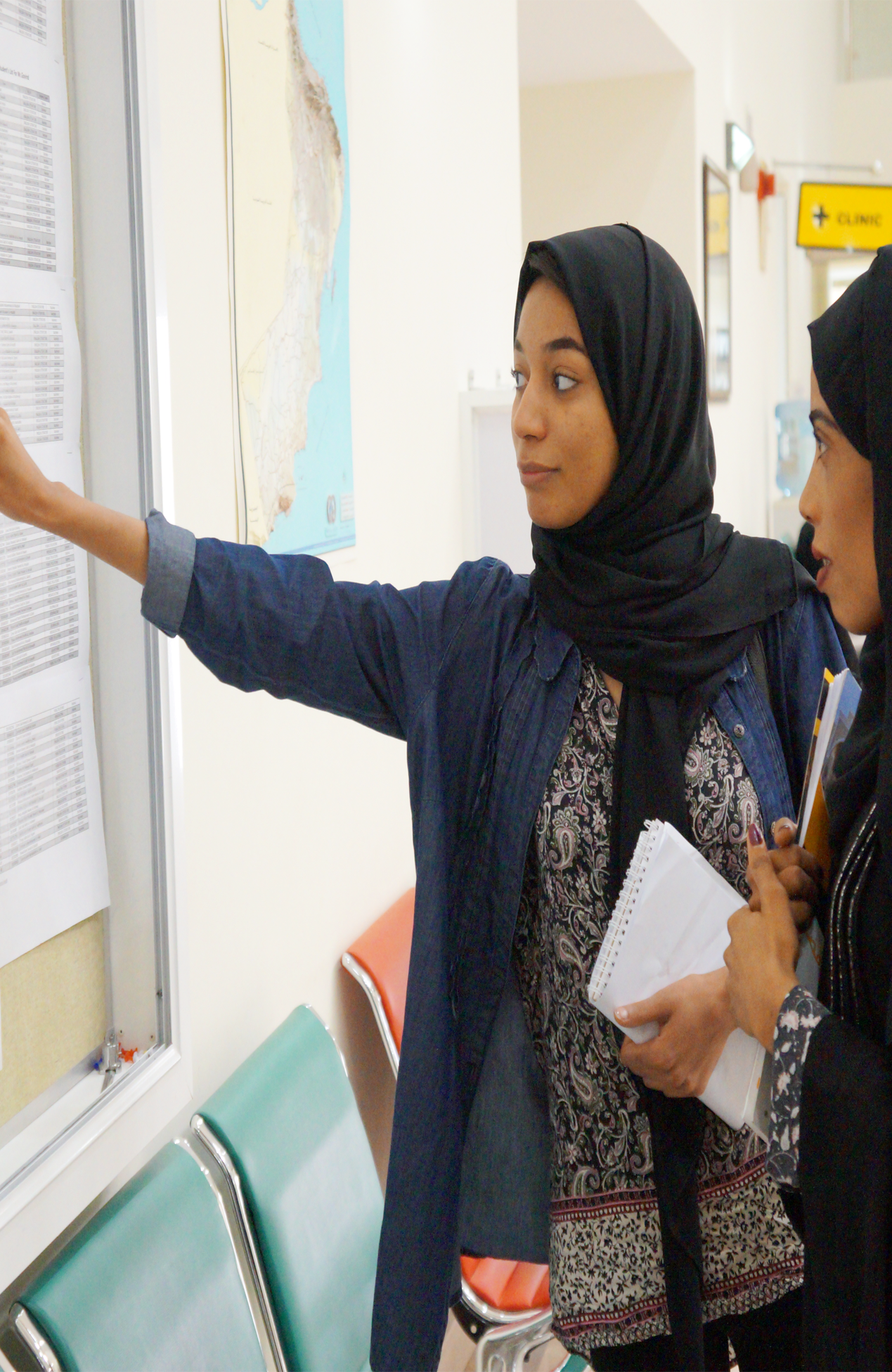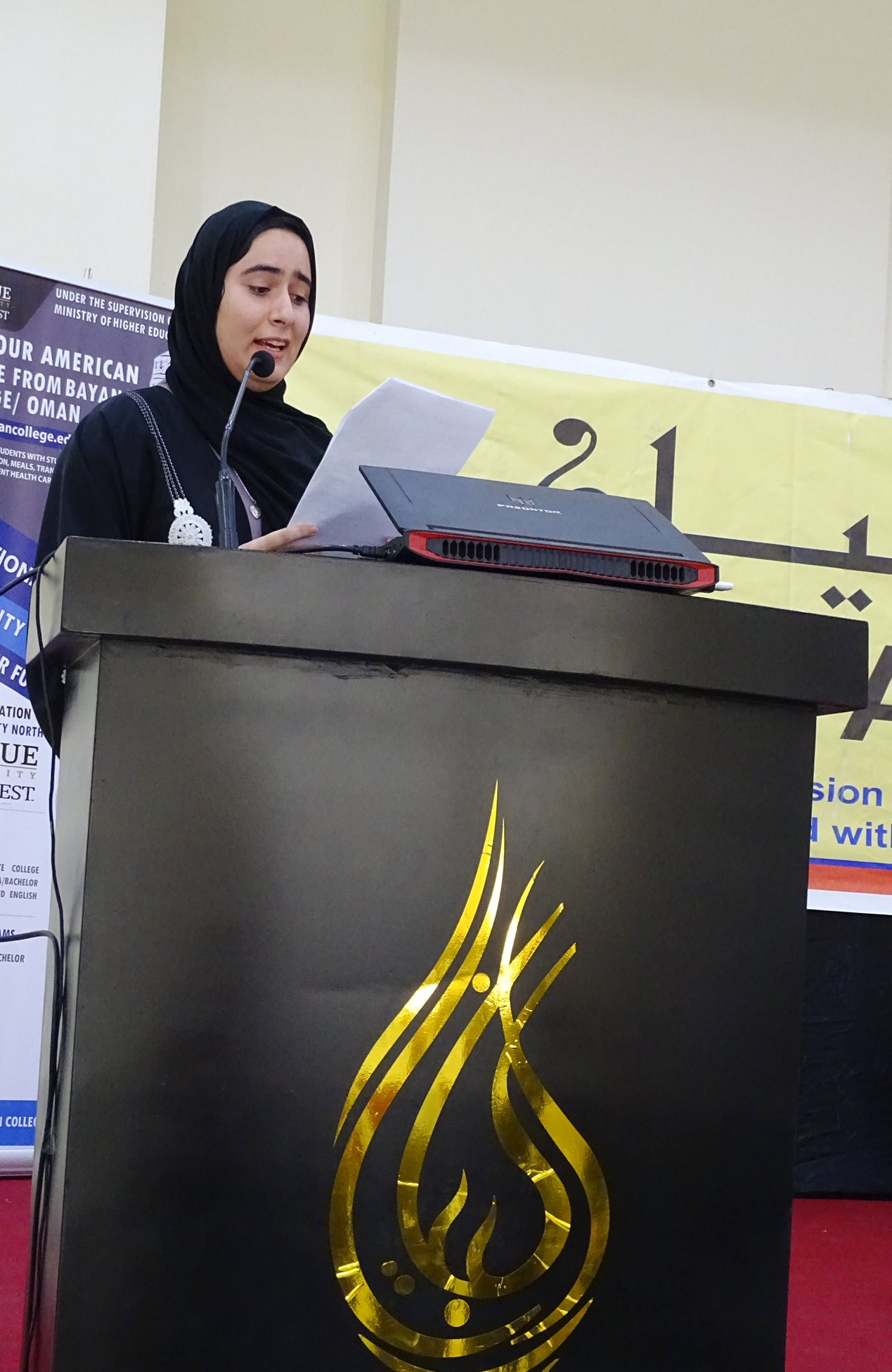The Semester System :
Bayan College follows the semester based system. Under the semester system the academic year is divided into three semesters. Fall and Spring Semesters (registration obligatory) are each comprised of 16 weeks including exams period. The Summer Semester (registration optional) is comprised of 8 weeks including exams period.
Credit Hour System :
Credit hours are not teaching or contact hours. Credits hours refer to the number of hours assigned to any given course and are awarded after the successful completion of any individual course. Credit hours might vary from one course to another. However, most courses at Bayan College are awarded total of (3) credit hours each. Teaching or contact hours refer to the number of hours a student spends in the classroom or labs. Teaching hours are not always equal to the credit hours. Practical courses might be taught in (4 or 6) hours, but they are awarded (3) credit hours only.
Student Credit Load :
To complete a Bachelor Degree in four years (excluding the foundation) an average unit load of (15) credit hours per semester is advised. A student with full time status shall register for no less than (15) credit hours in the Fall and Spring Semesters, and not more than (9) credit hours in the Summer Semester.
A full time student may register for (18) credit hours in a given semester when the following conditions are met-
a. The student has earned a Cumulative Grade Point Average CGPA (2.8) or higher in the previous semester.
b. The student has completed minimum of (30) credit hours in the previous semesters.
c. The student has obtained written consent from his/her academic advisor and approval of the Head of Department in which he/she is enrolled.
A graduating student may register for (21) credit hours in Fall and Spring Semesters and for (12) credit hours in Summer Semester. He/she should get permission from his/her academic advisors and Head of Department.
Under Probation students (with a GPA less than 2.00) carrying full time status can only register for up to (12) credit hours in Fall and Spring Semesters, but (6) credit hours in Summer Semester.
1. The Semester System
Bayan College follows the semester based system. Under the semester system the academic year is divided into three semesters. Fall and Spring Semesters (registration obligatory) are each comprised of 16 weeks including exams period. The Summer Semester (registration optional) is comprised of 8 weeks including exams period.
2. Credit Hour System
Credit hours are not teaching or contact hours. Credits hours refer to the number of hours assigned to any given course and are awarded after the successful completion of any individual course. Credit hours might vary from one course to another. However, most courses at Bayan College are awarded total of (3) credit hours each. Teaching or contact hours refer to the number of hours a student spends in the classroom or labs. Teaching hours are not always equal to the credit hours. Practical courses might be taught in (4 or 6) hours, but they are awarded (3) credit hours only.
3. Student Credit Load
To complete a Bachelor Degree in four years (excluding the foundation) an average unit load of (15) credit hours per semester is advised. A student with full time status shall register for no less than (15) credit hours in the Fall and Spring Semesters, and not more than (9) credit hours in the Summer Semester.
A full time student may register for (18) credit hours in a given semester when the following conditions are met:
a. The student has earned a Cumulative Grade Point Average CGPA (2.8) or higher in the previous semester.
b. The student has completed minimum of (30) credit hours in the previous semesters.
c. The student has obtained written consent from his/her academic advisor and approval of the Head of Department in which he/she is enrolled.
A graduating student may register for (21) credit hours in Fall and Spring Semesters and for (12) credit hours in Summer Semester. He/she should get permission from his/her academic advisors and Head of Department.
Under Probation students (with a GPA less than 2.00) carrying full time status can only register for up to (12) credit hours in Fall and Spring Semesters, but (6) credit hours in Summer Semester.
a. All students are required to maintain a Cumulative Grade Point Average CGPA of 2.0 or higher. A student whose cumulative GPA falls below 2.0 at the end of a semester, except the first semester and Summer Semester, is automatically placed on Academic Probation. The Admission and Registration Department will inform the student and hand on to him/her their AGPA report. This report also shows how many times a student has been under academic probation. The student will receive a warning letter from his/her Academic Advisor. It is the responsibility of the student to inform his/her family.
b. In case the student is enrolled in the Academic Program during Summer Semester, the semester that follows it must be counted as the first semester in calculating the number of times he/she is placed under-probation.
c. The student who gets the first Academic Warning has to raise the CGPA within two successive semesters (excluding Summer Semester).
d. Failing to do that for two successive semesters (excluding the Summer Semester) after the semester when he was placed under probation, a student will be advised to change his/her major or go to another college.
e. The College Council has the right to grant a student the chance to continue his/her studies after being placed under-probation for three successive semesters. In case he/she gets a CGPA of at least 1.8, he/she can be granted one more chance.
f. A student is cleared off the under-probation status once his/her CGPA becomes 2 or more by the end of any semester.
g. Under probation student is only allowed to register 12 credit hours.
h. For graduation a student’s AGPA must be 2.0 or more; otherwise he has to repeat courses he already passed with a grade less than “C”.
Students Attendance Regulations
Attendance for all classes is compulsory. Students are expected to attend all classes for which they are enrolled from the first day of the semester. Students are also expected to be punctual. Although lateness might sometimes be unavoidable, persistent lateness is not only disruptive to other students but is also harmful to student comprehension. A student who is 15 minutes late for his/her class will be recorded as absent and the teacher has the right to deny him access to the class.
Bayan College policy on students’ attendance states that:
1. If a student misses classes he/she is warned as follows:
a.The first warning will be issued to the student if he/she misses 10% of the teaching hours.
b. The second warning is issued if the student misses 20% of classes.
2. If a student misses 20% of the teaching hours, he/she will be excluded from sitting the final exam.
3. A student who is absent from a pre-announced examination (quiz, mid-term -final) will receive a failing grade unless a legitimate excuse is presented and approved by the Grievance Committee.
4. A student who misses a final exam for a legitimate excuse and approved by the Grievance Committee will be allowed to sit for a make-up exam while a grade of incomplete “I” will be posted on his/her record until the result of that exam is announced. He /she must sit for a make-up exam, as scheduled by the college. If a student fails to appear for the make- up exam within this period he will be given zero.
5. Legitimate excuses do not cancel absences and are considered only when students apply for course withdrawal.
6. We, at Bayan College, define a legitimate excuse as follows:
a. Illness of the student or serious illness of a member of the student’s immediate family.
b. The death of a member of the student’s immediate family.
All legitimate excuses must be supported by written proof or evidence such as an official and original sick leave or certified death certificate of an immediate family member.
Teaching Hours
Classes are conducted Sunday through Thursday from 8 AM to 9 PM.
Final and Make-up Exams Regulations
a. Sitting for the final exam is compulsory in order to pass a course regardless of the total mark scored in the semester work and mid-term exam.
b. If a student is absent from any exam without legitimate excuse he/she will receive “F” grade.
a. The total mark for any course is 100, it is the sum total of the final exam, mid-term exam and semester work. Semester work is the sum total of quizzes, assignments, presentations and reports assigned and approved by the Department Council. These marks should be announced to the students;
b. The Final Exam for each course is conducted once at the end of the semester. The questions should cover all the taught items.
c. The final mark for any course cannot be modified except by the Grievance Committee, after obtaining the approval of the College Council. This should be done within a week after the results announcement (as indicated in No. 24, p. 23). The Dean notifies the Admission and Registration Department with the decision within two weeks after the end of the semester in which the student studied the course.
d. The course is considered Incomplete and shows as “I” on the transcript if the student fails to show for the Final Exam for reasons beyond his/her control. The student has to apply to the Deanship requesting a make-up exam, attached with it certified documents. He/she has to show up for the make-up exam at the assigned date. If he/she fails to appear on that date he/she will be given “F” grade.
e. Students must repeat all the failed courses in accordance with the rules and regulations of the College. A student cannot repeat a course he has already studied and passed with “C” grade and above.
f. Make-up exams are conducted for students who didn’t show for the Final Exam based on the following:
— The student’s absence from the Final Exam was due to an excuse accepted by the Grievance Committee;
— This exam is conducted on the second week of the semester that follows the semester in which the student didn’t sit for the Final Exam;
— Grade “I “is given to the student who missed the Final Exam and his excuse was accepted;
— After sitting for the exam the instructor forwards the grade to the Registration and Admission Department.
Students must adhere to the following while sitting for the exams:
Students are responsible for checking that they are in the correct examination room;
a. Students must show College ID card and a “clearance receipt” to the invigilators on duty, sign in the attendance form provided;
b. Students are required to bring their own pens, pencils, and erasers. Sharing is not permitted;
c. Students must place all personal belongings in demarcated areas during exams, including mobile phones. Not doing so will be considered as a cheating attempt.
d. Students are expected to respect invigilators on duty and comply with all instructions announced by invigilators.
e. Students will be admitted to an examination room not earlier than 15 minutes before the examination is due to commence.
f. Late comers will only be admitted into the examination room if they show up during the first thirty minutes.
g. Latecomers are not granted extra time. All students must leave the examination room on the specified time.
h. Students MUST answer their exam questions on paper provided by the instructor or invigilator.
i. Students are expected to remain in the room during the exam and not leave except for absolute emergencies (i.e. bathroom or illness).
Final Exams Results and Degree Awarding
a. Results of exams are released during the period specified by the college council after the final exams.
b. Results of make-up exams are released during the period specified by the college council after the final exams.
c. Graduation certificates are awarded three weeks after the end of the exams attested by the College and MoHE.
d. Convocation certificates are awarded on the day of the graduation ceremony, after getting appropriate approvals from MoHE and Purdue University Northwest.
e. Graduation and convocation certificates are provided free of charge only once. For any additional copies, the student should pay the following after submitting a request form:
— RO 15 for the Graduation certificate
— RO 35 for the Convocation certificate.
Assessment Regulations
1. General Foundation Program Assessment
Non-credit bearing courses (such as General Foundation Program courses) do not affect a student’s GPA. However, it is considered a pre-requisite to pass all the Foundation courses (with a grade of 50% or higher) in order to progress to the next level of General Foundation Program.
2. Assessment in Academic Departments
Continuous evaluation of a student’s academic performance employs a variety of assessment tools such as homework, exams, quizzes, projects, research papers, written and oral presentation, class participation, etc. Successful completion of a course requires students to score a minimum of 50%. Students scoring lower than 50% in any given course will receive an F grade and must repeat the course.
Grading System
a. A student has the right to get a detailed report from Admission and Registration Department of his GPA and AGPA.
b. The report is free of charge for the first time. An additional copy will be charged OR (1) for each copy.
The following grading system shall be used to measure a student’s achievement in any academic course and determine a student’s Grade Point Average (GPA).
| Marks (%) | Letter Grade | GPA points | Definition |
| 95-100 | A | 4.0 | Excellent |
| 90- 94 | A- | 3.7 | |
| 85- 89 | B+ | 3.3 | Very Good |
| 80- 84 | B | 3.0 | |
| 75- 79 | B- | 2.7 | |
| 70- 74 | C+ | 2.3 | Good |
| 65- 69 | C | 2.0 | |
| 60- 64 | C- | 1.7 | |
| 55- 59 | D+ | 1.3 | Satisfactory |
| 50- 54 | D | 1.0 |
AGPA (Accumulative Grade Point Average)
a. The AGPA (sometimes called CGPA which stands for Cumulative Grade point Average) is a figure that reflects the grade point average for all classes students have taken and for classes for which they have received credit (pass or fail). For incomplete student, an AGPA is calculated only after settling such course i.e. sitting for a make –up or missing the chance for doing that.
b. A student’s AGPA upon graduation is decided by the average of all the study plan courses he successfully passed
c. SGPA (Semester Grade Point Average) is the average of all course studied by the student in a semester.
d. The average is calculated by multiplying mark obtained in each course by number of credit hours, then divided by total number of credit hours.
e. Averages are rounded to the nearest fraction.
Cheating and Dishonesty
Bayan College considers cheating and plagiarism unacceptable conduct and the College will impose sanctions on students who cheat or plagiarize. Students are expected to be honest in meeting the requirements of courses in which they are enrolled.
Students who engage in cheating or plagiarism will be subject to disciplinary actions including, but not limited to, failing or receiving a lower grade for the piece of work in question or overall course work. In serious cases, students’ dismissal from a course, suspension from their studies, and/or expulsion from the College will be considered.
a. Definition of Cheating
Cheating is the act of obtaining or attempting to obtain credit for academic work by dishonest means which include, but not limited to:
— Consulting notes, books, or any course materials during quizzes, tests, or examinations which have not been authorized by the relevant instructor;
— Copying another person’s answer(s) to an examination question(s);
— Consulting electronic devices during an examination without obtaining authorization from the relevant instructor;
— Helping another student during examination(s);
— Submitting as one’s own work a research paper, a project or a presentation in part or whole which has been stolen or borrowed;
— Submitting a work that has been done for one class to a second class without informing the instructor of the second class and getting his/her consent;
— Changing academic record, falsifying transcript, grades, or an attendance roster.
b. Definition of Plagiarism
Plagiarism is the act of using another person’s words, ideas, writing, expressions, sentences, paragraphs, approach, or intellectual work in part or whole, and representing them as one’s own work and/or ideas without appropriately citing that person. In other words, plagiarism is considered a form of cheating to obtain, or attempting to obtain, credit for someone else’s academic work.
A student who downloads a text from the internet, re-writes a paragraph from a book or an article, or even uses a sentence to be incorporated in an assignment and hands it in to receive a credit or a grade without proper acknowledgement or referencing, is subject to disciplinary actions. However, students are encouraged to use the work of others with proper acknowledgement. Bayan College has made Turnitin software available to all the students so that they can check the authenticity of their assignments and research papers prior to submission.
c. Disciplinary Actions
In case of an offence of cheating or plagiarism, Bayan College reserves the right to apply the following disciplinary measures:
— First offence: failing mark in an examination and “F” grade in a course, along with a written warning with copies to his academic file and his family
— Second offence: In case of a repeated offence, he/she will fail the whole semester.
— Third offence: He/she will be dismissed from the College.
Regulations on Social Conduct
To maintain a healthy educational and academic environment students must adhere to the following rules:
— All students/visitors should abide by the College’s regulations and show his/her ID when asked to;
— All students/visitors should abide by the instructions and procedures issued by the College and demonstrate decency and respect for feelings, traditions andchea beliefs of others and stay away from everything that might disrupt security and healthy learning environment;
— Students shall turn off or silence their cellular phones in class sessions, computer laboratory sessions, and in any administrative offices;
— The College will not tolerate clothing that goes against the culture of Oman. Also the College bans face veils (Burqaa, Niqaab) on College premises including, but not limited to, offices, classrooms, computer labs, and all College facilities;
— Non-compliant Students will be referred to the Disciplinary Council. This Council and the College Council have the right to permanently dismiss any student found violating these instructions from the College.
Every time a violation to the above mentioned rules is reported to the Student Affairs, the student will promptly be denied access to the College. Furthermore, the student will be subject to disciplinary actions which include, but not limited to:
— Warning: the student will be warned that he/she has violated the College dress policy and that subsequent violation may lead to more severe actions.
— Written Warning: the student will be given written warning notice that he/she has violated the college policy on dress. The warning notice will be placed in the student’s academic record.
— If necessary, the student’s family or relevant parties will be informed when violation occurs.
— The College reserves the right to ask the student to withdraw from the College permanently.
— Limited Suspension: a Burqua wearing student will be informed in writing that she will be denied access to the College facilities or services till she complies with the rules and stop wearing it.
Disciplinary Council
Students are members of the College community and as such are expected to behave responsibly, to respect people and property, and to comply with the College rules and regulations, whether on College premises or elsewhere. The behavior of students should not interfere with the proper functioning or activities of the College, with those who work or study in the college or otherwise damage the College. Where there is reason to believe that a student has broken the College rules or regulations, assaulted any teaching Staff, Administrative or student, or their behavior does not meet the required standards, the College will take action as outlined in these regulations. If a student refuses to adhere to the decisions taken by the Disciplinary Council he will be expelled permanently from the College. The College Disciplinary Council, chaired by the Deputy Dean, is responsible for the maintenance of discipline in the College, as specified in the College statutes.
Disciplinary Council Duties
a. Serves as a hearing Council for alleged violations of college student regulations as specified in the College Bylaws;
b. Serves as an appeal Council for decisions evolving from disciplinary hearings;
c. Imposes sanction(s) if the alleged violator is found guilty which might be expelling the violator from the College after the decision is endorsed by the College Council;
d. Follow up implementation of sanctions, in coordination with all relevant departments.
Bulletin Boards
They are located at the College main gate and in the academic and administration buildings. They are for official use only. Students should obtain permission from Students Affairs Department for posting any notice on these boards. In order to maintain the orderly appearance of our building any notice must be posted on the appropriate bulletin board. The administrative staff may remove any notice posted on doors or walls or not bearing the College seal.
General Rules
a. A graduating student should fill in a form available at the respected department, no later than 8 weeks from commencement of Fall and Spring Semesters and 4 weeks from Summer Semester. The department in coordination with Admission and Registration Department office will ensure that the student meets graduation requirements.
b. A student with Diploma or BA from Bayan College is allowed to enrol for another Diploma or BA. He/she should submit an application to the Admission and Registration Department. The application will be studied by the Equivalency Committee to decide which of the courses already covered fall within the study plan of the new major. Transferred courses are not included in the AGPA.
c. A graduating student should get a clearance certificate as part of the graduation procedure.
d. Graduation Certificate is given at the end of the semester and bears the date of that semester.
e. Students should read all the instructions, rules and regulations written in this handbook as well as those issued by the college or posted on the notice boards. It is the responsibility of the students to familiarize themselves with all instructions, rules and regulations. No excuses will be entertained.












